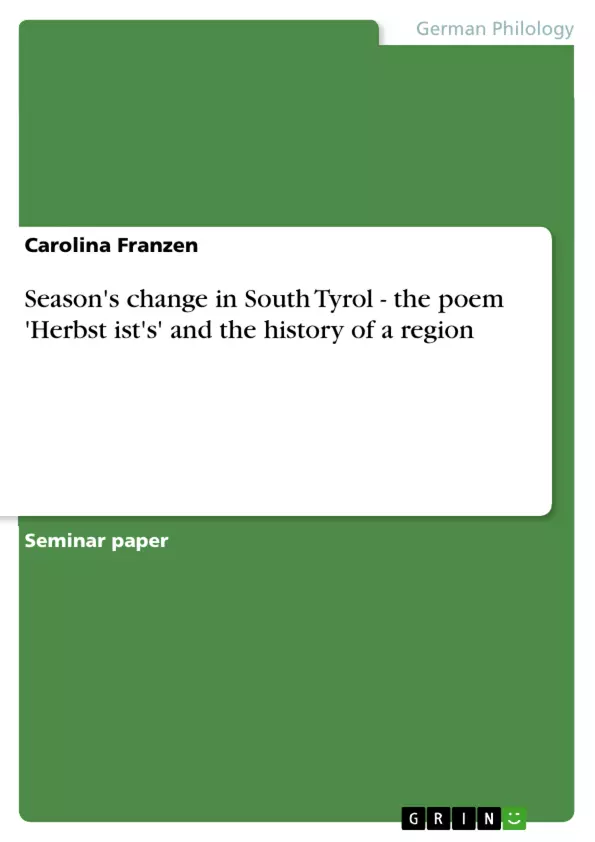The aim of this essay shall be to have a closer look at South Tyrol before and during World War II - through the eyes of the South Tyroleans. The poem 'Herbst ist´s' of the 1930s, written anonymously and hidden in Bozen´s Country Archive for almost 60 years, shall take centre stage in the following analysis. I will try to show the impact which Hitler's and Mussolini's policies had on people's everyday lives and how this led to a division of the entire society.
Inhaltsverzeichnis (Table of Contents)
- THE POEM “HERBST IST´S” AND THE HISTORY OF A REGION
- Historical Background
- German Culture Under Italian Rule
- German Hopes of Annexation
- South Tyrol Sacrificed by Hitler
Zielsetzung und Themenschwerpunkte (Objectives and Key Themes)
This essay aims to provide a nuanced understanding of the impact of World War II on South Tyrol through the lens of the anonymous poem “Herbst ist's”. It examines the region's history in the context of the competing ideologies of Hitler and Mussolini, highlighting the cultural and social changes experienced by South Tyroleans under Italian rule.
- The complex political situation of South Tyrol during World War II
- The impact of Italian fascist policies on the German community of South Tyrol
- The contrasting perspectives of the German and Italian populations in the region
- The role of the poem "Herbst ist's" as a reflection of the lived experiences of South Tyroleans
- The strategic importance of South Tyrol in the context of Nazi Germany and Fascist Italy
Zusammenfassung der Kapitel (Chapter Summaries)
The essay begins by outlining the historical context of South Tyrol in the 20th century, focusing on the region's transition from Austrian rule to Italian control after World War I. It then delves into the cultural and social oppression experienced by the German community under Italian fascist rule, citing examples of linguistic suppression, cultural suppression, and persecution.
The essay further explores the German population's hopes of annexation by Nazi Germany, analyzing Hitler's rhetoric and policies in relation to South Tyrol. This section sheds light on the contradictory role of Hitler, who, despite expressing a desire for the revival of Germany, ultimately sacrificed South Tyrol to secure an alliance with Italy.
Schlüsselwörter (Keywords)
The essay explores the themes of cultural suppression, political manipulation, ethnic identity, historical trauma, and the impact of war on civilians. It also delves into the analysis of the anonymous poem “Herbst ist's”, which serves as a primary source to understand the lived experiences of South Tyroleans during World War II. The essay centers around key figures such as Hitler, Mussolini, and Ettore Tolomei, and examines the political and ideological conflicts that shaped the region's history.
Frequently Asked Questions
What is the significance of the poem 'Herbst ist's'?
The poem, hidden for 60 years, reflects the lived experiences and suffering of South Tyroleans under Italian fascist rule and Nazi influence during World War II.
How did Italian rule affect German culture in South Tyrol?
Under Mussolini, German culture faced severe suppression, including linguistic bans and cultural persecution aimed at "Italianizing" the region.
Why did Hitler "sacrifice" South Tyrol?
Hitler sacrificed the interests of the ethnic Germans in South Tyrol to secure and maintain his strategic alliance with Mussolini's Italy.
What were the German hopes regarding annexation?
Many South Tyroleans hoped for annexation by Nazi Germany to escape Italian oppression, leading to a deep division within the society.
Who was Ettore Tolomei?
Tolomei was a key figure in the Italianization process, known for translating German place names into Italian to erase the region's Austrian history.
- Quote paper
- Carolina Franzen (Author), 2007, Season's change in South Tyrol - the poem 'Herbst ist's' and the history of a region, Munich, GRIN Verlag, https://www.grin.com/document/73272



